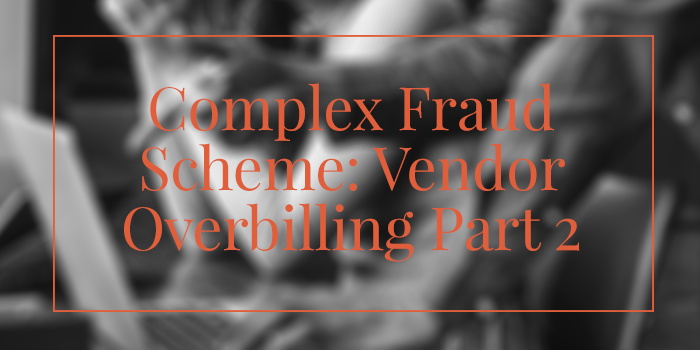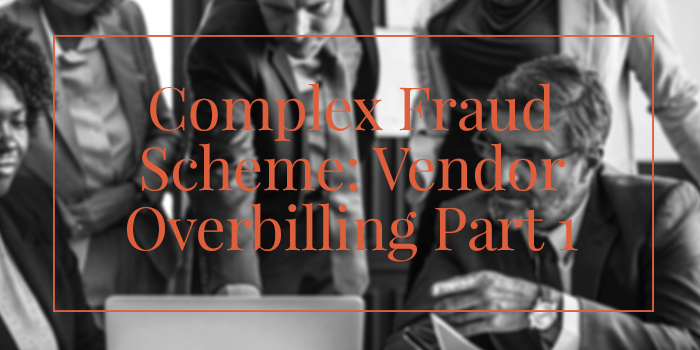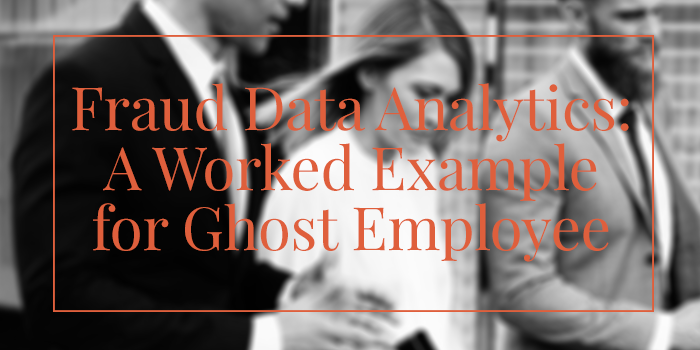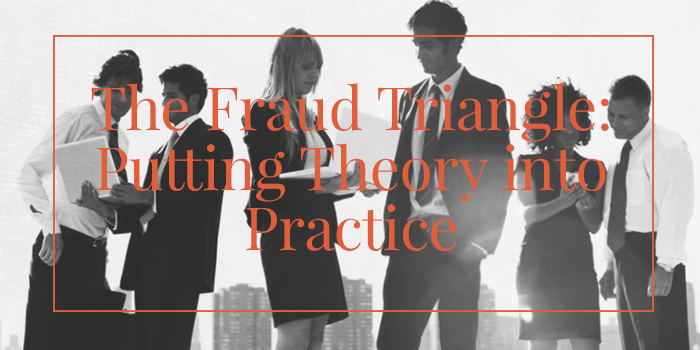In our first blog in a series on fraud data analytics, we identified a ten-step methodology for conducting a fraud data analytics project. In this blog, we will discuss steps seven and eight:
Fraud Auditing, Detection, and Prevention Blog
Leonard W. Vona
Recent Posts
Fraud Data Analytics: The Process of Selecting Transactions for Fraud Testing
May 21, 2019 8:00:27 AM / by Leonard W. Vona posted in Fraud Data Analytics, Fraud Auditing, ...
Fraud Data Analytics: Eight Critical Steps to Building Your Search Routines
Apr 18, 2019 8:29:16 AM / by Leonard W. Vona posted in Fraud Data Analytics, Fraud Risk Statements, ...
Uncovering Fraud Using Fraud Data Analytics: Part 3 + 4
Mar 26, 2019 4:55:40 PM / by Leonard W. Vona posted in Fraud Data Analytics, Fraud Risk Statements, ...
Fraud Analytics: Planning considerations
Fraud Data Analytics: Which data mining strategy is appropriate for the scope of the fraud audit?
Feb 14, 2019 4:28:28 PM / by Leonard W. Vona posted in Fraud Auditing, Fraud Based Approach, ...
Fraud Data Analytics: Selecting the Strategy
In our first blog in a series on fraud data analytics, we identified a ten-step methodology for conducting a fraud data analytics project. In this blog, we will discuss step three:
Fraud Data Analytics: The Planning Phase
Jan 8, 2019 5:28:27 PM / by Leonard W. Vona posted in Fraud Auditing, Fraud Based Approach, ...
In our first blog in a series on fraud data analytics, we identified a ten-step methodology for conducting a fraud data analytics project. In this blog, we will discuss steps one and two.
Uncovering Fraud Using Fraud Data Analytics: Part 1
Dec 1, 2018 7:45:04 AM / by Leonard W. Vona posted in Fraud Data Analytics, Fraud Risk Statements, ...
This blog is the first in a series of seven to explain how to perform fraud data analytics. It introduces a ten-step approach along with explaining the concept of fraud auditing.
For years, auditors, myself included, would launch a fraud detection project by getting the data and playing with the data. At least that was the expression. We hoped to trip across a fraud scheme. We had no specific plan, just a simple goal: Find fraud. We did not know what we were looking for, but we were looking. Eventually, we hoped to find something. But, those days are over.
Complex Fraud Scheme: Vendor Overbilling Part 2
Aug 6, 2018 9:47:00 AM / by Leonard W. Vona posted in Fraud Data Analytics, Fraud Risk Statements, ...
This is part two of a blog post series examining a worked exampled using fraud data analytics on a complex fraud scheme.
In this post we will look at how to use fraud data analytics designed to uncover the complex fraud scheme and the fraud audit procedures designed to provide creditable evidence that the scheme is being perpetrated by the budget owner.
Complex Fraud Scheme: Vendor Overbilling Part 1
Aug 2, 2018 9:07:00 AM / by Leonard W. Vona posted in Fraud Data Analytics, Fraud Risk Statements, ...
In our fraud risk registers, we have identified over 100 procurement fraud schemes and over 100 overbilling fraud schemes. When these kinds of numbers are involved the idea of finding complex fraud schemes in your core business systems may seem overwhelming. However, fraud data analytics can simplify and improve the process.
In this blog we have selected a complex corruption scheme and a complex overbilling scheme to illustrate how fraud auditing can detect even the most complex schemes. The starting point is to identify the fraud risk statement and then understand how and where the scheme can occur in your organization.
Fraud Data Analytics: A Worked Example for Ghost Employee Fraud Schemes
Jul 12, 2018 12:38:00 PM / by Leonard W. Vona posted in Fraud Data Analytics, Fraud Schemes, ...
Ghost employee schemes are a common fraud scheme during which there are people on the payroll who don’t work for the company in question but do collect a salary or remuneration.
Let’s take a closer look at how you can use fraud data analytics when creating an executing an audit program for ghost employees:
The Fraud Triangle: Putting Theory into Practice
Jul 6, 2018 1:06:00 PM / by Leonard W. Vona posted in Fraud Auditing, Fraud Detection, ...
The fraud triangle, authored by Dr. Cressey, has been adopted by the auditing profession as a tool to help detect and deter occupational fraud.
The model has many applications in the fraud audit. The primary purpose is in the planning stage to help identify where and why your organization would be vulnerable to someone committing a fraud risk scenario.
Here’s a closer look at the fraud triangle and how you can implement this model.













